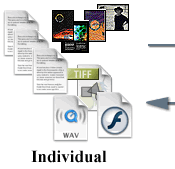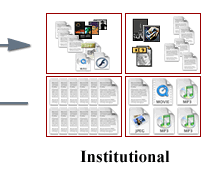Untitled
| "What if individuals were provided with the tools to easily automate, create, and share personal digital libraries or repositories designed to meet the productivity needs of the scholar, administrator, or student—systems designed to organize and facilitate their own research, work, or learning agendas?" Paul |

Illustration by Derek Lea © 2004
|
 |
 |
Institutional repositories may best be developed from the bottom up…
Paul Gandel, Richard Katz and
Susan Metros discuss the life of a mind in an era of abundance, noting
that, thanks to the proliferation of computers and networks, access to
information is now relatively easy, inexpensive widespread and
democratic. The challenge as they see it is in the management of all
this information which they envision can only be accomplished by an
“information ecology” that focuses on organically building shared
knowledge stores from the bottom up.
Segue allows individuals to create their own organizational schema…
Segue is designed first and
foremost for the development of such individual repositories with
strong support for the hierarchical and chronological or sequential
organization of evolving content granules. In addition, Segue allows
its users to attach discussions/assessments of their content granules using an interface modeled on the commenting systems of many weblog tools.
Segue repositories are built from content nodes in a hierarchy…
Content granules are
essentially nodes in a hierarchy which provides their organizational
structure and context. As such they can moved anywhere in that
hierarchy or can be moved to any other hierarchy the given user has
access or in a given instance of Segue. A given instance of Segue can
be used for a single personal repository or a collection of many
individual repositories that would make up the collective repository of
a community or institution.
Segue | Harmoni | OKI